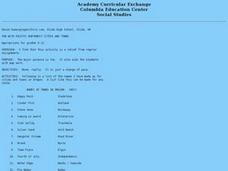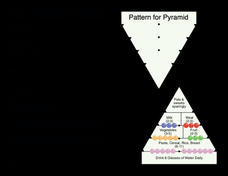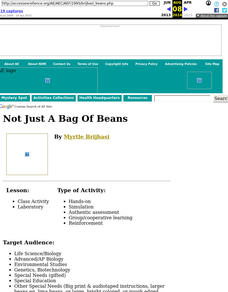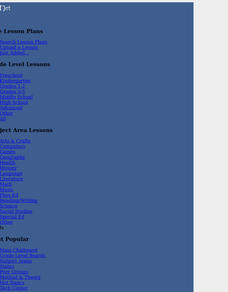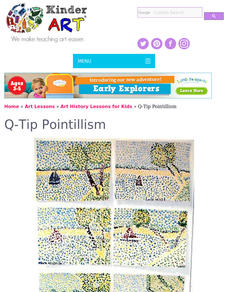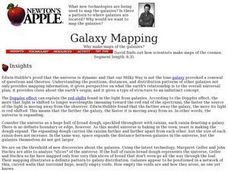Curated OER
Fun With Pacific Northwest Cities and Towns
Intended for fun only, learners play with the names of cities common to their region or state. This lesson includes a list of cities in Oregon and not much else. What you and your class choose to do with your list of cities is up to you.
Curated OER
Food Pyramid Abacus
Students examine the importance of eating a healthy balanced diet. They read and discuss an article about the Food Guide Pyramid, and construct a Food Pyramid Abacus.
Curated OER
Midwest Hospitality
Students create snowflakes using the ideas of symmetry, perpendicularity, and regularity in this Art lesson that incorporates Mathematical concepts and artistic design. The lesson includes a materials list, vocabulary list, and possible...
Curated OER
On Which AC/DC Album?
High school students can hone their research skills by utilizing the Internet to find the answers to the trivia questions presented in this on-line worksheet. This particular worksheet focuses on questions about the band AC/DC. There are...
Curated OER
Whitewashing History
Young scholars revisit issues of civil rights in the U.S. They use the recent national discussion of retiring Senator Strom Thurmond's 1948 Dixiecrat Presidential campaign as a starting point.
Curated OER
Where the Spirit Moves You
Students explore the spiritual significance of locations throughout the world. After studying the historical and mystical importance of these places, students write about a spiritual place that is special to them.
Curated OER
Volcano Hazards
Learners research volcano hazards in VolcanoWorld, make a paper volcano, produce and watch the effects of ashfall, produce and watch the effects of a mudflow and create a hazard map by plotting historical ashfall/mudflow data from Mount...
Curated OER
Not Just a Bag of Beans
Students determine the types of natural selection and variation that exists in a population, using beans.
Curated OER
Genetics the Easy Way
Students use recyclable trash to construct a Recycle Critter family. They calculate the probability of the phenotype of the offspring that two heterozygous parents produced.
Curated OER
Lub Dub (Valves)
Students create a manipulative out of film canister that can emulate the sounds of the heart. By using their creation, students can underrated the sounds of the heart and their sources.
Curated OER
Mission Possible
Students create blueprints for imaginary inventions based on real-world technological principles. They write explanations of how their inventions work in the form of movie dialogues.
Curated OER
Why are Polar Bears White
Students explore camouflage as they study polar bears and their habitat. They study how color can help animals in the wild.
Curated OER
Designing Tools for Ocean Exploration
Students explore the complexity of ocean exploration and the technological applications and capabilities required for ocean exploration. They consider the importance of teamwork in scientific research projects.
Curated OER
Measuring Techniques - Level I
Demonstrate food preparation techniques of salads, soups, casseroles, breads, meats, poultry and pastries.
Curated OER
Kitchen Equip and Lab Procedures - Level I
If students use and store kitchen equipment appropriately as well as utilize sanitary work habits, the foods laboratory will be a safe and easy place to work. See Preface Materials: As a motivator ask: "Why should I worry whether or not...
Curated OER
Surface to Volume Ratios
High schoolers measure the rate of diffusion and to calculate the surface area to volume ratios of varying cell sizes. The lesson is very clearly organized with a useful student worksheet provided. They perform a lab experiment which is...
Curated OER
Only the Shadow Knows
Young scholars become familiar with the causes for formation of shadows. They create shadows, compare the size and shape of the shadow with the actual object, engage in shadow play theatre, and discover what happens to shadows when there...
Curated OER
Identifying Erosion
Students identify erosion in various forms and explain its causes. They look for evidence of erosion on school grounds, describe it in their journals, and draw labeled rough sketches of the erosion.
Curated OER
Pass it On
Young scholars participate in a class activity to help them master geometric terms and their definitions.
Curated OER
Sound Vibrations
Students play their own straw kazoos and understand that vibrations are responsible for the sounds we hear. Additionally, they learn that sound vibrations can travel through different mediums. Students experience vibrations through...
Curated OER
Galaxy Mapping
Young scholars research the constellations and discuss their findings. Then they construct their own maps of the galaxy using paper, black paint, aluminum foil, etc. They make a 3-D map of their chosen constellation.
Curated OER
Follow the Sun
Students use a simple model of the Earth and Sun as seen from space to explore the sun's apparent movement across the sky over the course of a day and year. They consider the apparent direction of movement and changes in the sun's angle.
Other popular searches
- Faces Edges Vertices
- Faces, Edges, Vertices
- Vertex Edge Graphs
- Vertex Edge Graph Worksheets
- Edge Cities
- Edge Effect
- Vertex Edge
- Vertex Edge Graph Mapping
- Faces, Vertices, Edges
- Vertices and Edges
- Cylinder Edges
- Color Vertex Edge Graph



